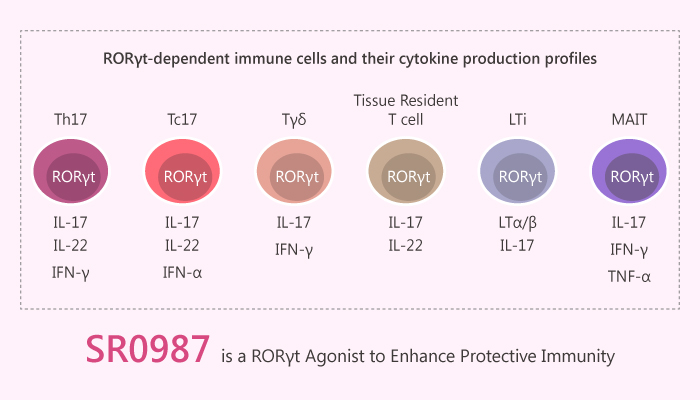The transcriptional activity of most nuclear receptors (NRs) can be modulated by small lipophilic molecules such as hormones, vitamins, steroids, and synthetic molecules. The NR1F subfamily of NRs contains the retinoic acid receptor-related orphan receptors (RORs), including RORα, RORβ, and RORγ. Besides, RORs can regulate a variety of physiological processes and participate in the pathophysiology of diseases. RORγt is expressed in thymocytes and regulates the survival of T cells during differentiation and drives the activation and differentiation of CD4+ and CD8+ cells into TH17 and Tc17. TH17 and Tc17 are effector cells that promote inflammation, adaptive immunity and autoimmunity by producing IL17 and other inflammatory cytokines. A study from Chang MR discovered and identified a RORγt agonist SR0987, with an EC50 of 800 nM.

In the study, the authors suggested that activation of RORγt using synthetic agonists drives the proliferation of TH17 cells while decreasing levels of PD-1. It is a mechanism that should enhance anti-tumor immunity while blunting tumor-associated adaptive immune resistance. Interestingly, putative endogenous agonists drive the proliferation of TH17 cells but do not repress PD-1. These findings suggest that RORγt agonists should activate TC17/TH17 cells, repress PD-1, and produce IL17 in situ. Enhanced immunity and blockage of immune checkpoints have transformed cancer treatment, thus such a molecule would provide a unique approach for the treatment of cancer.
SR0987 clearly shows a concentration-dependent induction of reporter gene expression. Moreover, SR0987 treatment results in a statistically significant reduction of the surface expression of PD-1 whereas desmosterol treatment shows no effect. Treatment with SR0987 and or desmosterol results in a trend towards increased IL17 production.